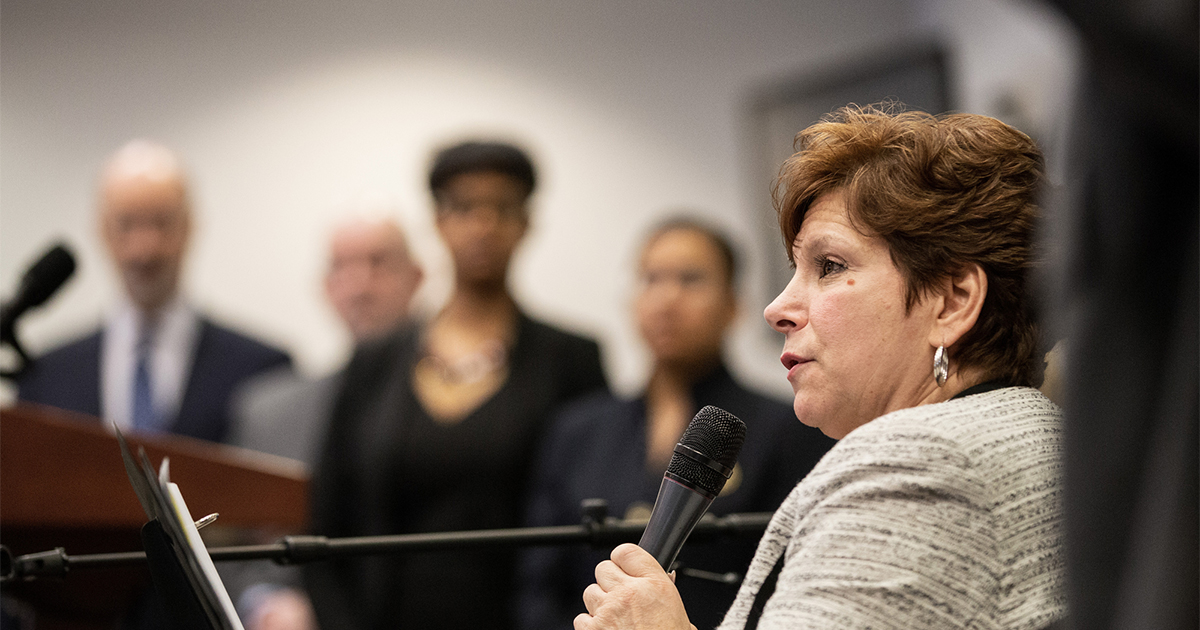During a news conference at Temple University, Tartaglione highlighted new legislation to expand the protections of PA’s Human Relations Act.
PHILADELPHIA, PA, April 6, 2018 – State Sen. Christine Tartaglione yesterday announced new legislation that proposes to add sexual orientation and gender expression as protected classes under Pennsylvania’s Human Relations Act, while expanding the act’s worker protections to include non-employee contractors and unpaid interns.
Sen. Tartaglione’s bill is part of a package of legislation authored by Senate and House Democrats and supported by Gov. Wolf. The governor and legislators announced their initiative at Temple University’s Liacouras Center.
Sen. Tartaglione’s comments appear below:
“Thank you to the Governor, my legislative colleagues and all the public officials who have gathered here to mark this important occasion. Also thank you to the advocates who are fighting on the front lines to prevent sexual harassment and to help victims when sexual harassment does occur.
Believe me, sexual harassment does occur more often than we think and more often than it’s reported.
The focus of my legislation – my part of the package – is to make sure that victims of sexual harassment in the workplace feel empowered to report these incidents and that the law is fully inclusive of the many different people who suffer sexual harassment.
I want workers to understand the protections available to them. I want the reporting process to be easier. I want to protect victims from retaliation by their employer when they do report it.
As we’ve said, this is a BIG problem with many facets. Often, workplace sexual harassment coincides with other discriminatory behavior by a boss or employer. And the victim may be part of more than one protected class – such as age, gender, race, national origin or religion. But consider this for context: in the last six years, the Human Relations Commission has resolved more than 14,500 cases of all types. Among those, more than 12 thousand – that’s 83 percent – involved the workplace.
That’s probably only the tip of the iceberg. For one thing, current law doesn’t classify sexual orientation or gender expression as a protected class. So, if a boss harasses a subordinate because the worker happens to be gay, Pennsylvania’s Human Relations Act may not apply. My bill would add sexual orientation and gender expression as protected classes.
Likewise, current state law doesn’t explicitly protect unpaid interns or independent contractors. This loophole can help an employer avoid accountability not on the merits of a case, but on a technicality. My bill adds those protections for interns and contractors who, for all practical purposes, are employed.
Right now, you may be asking: What’s the advantage of giving a victim access to the Human Relations process? Why can’t the victim just file a civil lawsuit or criminal complaint?
It’s true that federal law mirrors Pennsylvania’s Human Relations Act in many instances. The jurisdictions overlap. But state law gives victims access to potentially faster, sustainable resolutions that satisfy all parties. The PHRC conducts independent, impartial investigations and offers mediation with penalties. If that doesn’t work, violators can be forced to pay uncapped damages. So it’s usually in their best interest to cooperate.
In closing, I’d like to reinforce that this package is just a starting point for meaningful legislative action. We want to do more research on workplace sexual harassment and gather as much information as possible so we can advance prevention and education while continuing to protect victims.”
# # #
If you would like more information about this topic, please contact William Kenny at 215-533-0440 or email at William.Kenny@pasenate.com.

